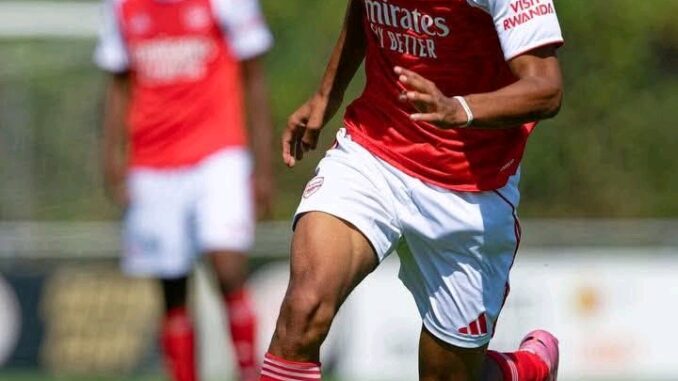
The recent discussion surrounding 15-year-old Emerson Nwaneri, younger brother of Ethan Nwaneri, has sparked excitement, curiosity, and speculation across the football community. With reports highlighting his impressive form—most notably a standout hat-trick performance against Chelsea’s U16 side—many fans have begun questioning whether the young talent might soon break into senior football or at least earn an early debut in domestic cup competitions. However, despite the hype surrounding his potential and his eligibility for tournaments such as the League Cup, the reality of his current situation paints a far more gradual and measured developmental trajectory.
Emerson is undoubtedly a gifted young footballer, displaying technical maturity, confidence on the ball, and natural instincts that have allowed him to shine in academy-level matches. Scoring three goals against a strong Chelsea youth side at just 15 is a remarkable achievement and a testament to his promise. Yet these accomplishments, while impressive, do not alter the fundamental truth: he is still in the early stages of his academy development and is far from being physically or mentally prepared for the intensity and demands of senior-level football.
Football analysts and insiders—including those referenced in reports such as @IsaanKhan—emphasize that his rapid rise within the academy should not be mistaken for readiness to appear in the first team. Modern football places immense physical, tactical, and psychological pressures on young players, and clubs are extremely cautious when it comes to accelerating their progression too quickly. The journey from academy standout to first-team regular is long, structured, and supported by multiple stages of gradual growth.
Even though Emerson is technically allowed to feature in competitions like the League Cup due to eligibility rules, this does not equate to practical readiness. Clubs rarely, if ever, field players as young as 15 in senior fixtures unless they are transcendentally exceptional, and even then, such appearances are carefully controlled and strategically timed. In Emerson’s case, the coaching staff’s primary focus remains ensuring his long-term development rather than rushing him into the spotlight for short-term excitement or fan-driven expectations.
Moreover, his brother Ethan’s unusually early Premier League debut has perhaps added to the external pressure, with some fans assuming the younger sibling might follow a similar accelerated route. But every player’s journey is unique, and clubs are mindful not to replicate developmental pathways simply because of family ties or comparisons. Emerson must continue to progress through the natural academy structure—U16s, U18s, and eventually U21s—before being considered for first-team involvement.
In essence, while Emerson’s talent is undeniable and his recent performances have generated deserved attention, any talk of him nearing a first-team appearance is premature. Those within the club view him as a long-term project—a player with the potential to grow into a future star if nurtured correctly, but one who must be protected from excessive expectations too early in his career. For now, the focus remains on steady development, academy progression, and ensuring he builds the foundation needed for future success.
As such, fans should appreciate Emerson’s promise while understanding that his debut at senior level is not close. His moment may eventually come, but it remains a distant prospect for now.
Leave a Reply